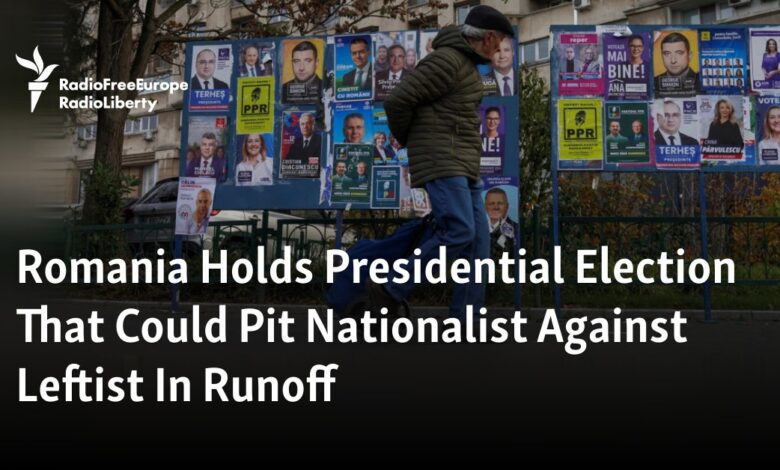Russia-Friendly Candidate Takes Surprising Lead In Romanian Presidential Vote, Runoff Expected

BUCHAREST — Pro-Russia candidate Cailin Georgescu has edged ahead in Romania’s presidential vote, partial preliminary results showed, throwing the race into unexpected territory and setting up a likely runoff against Prime Minister Marcel Ciolacu.
With 99 percent of polling stations reporting on the November 24 vote, Georgescu – who has been criticized for his anti-NATO sentiments – led with 22.65 percent of ballots.
The pro-Western Social Democrat Ciolacu had 19.45 percent of the vote, according to election officials, setting up an expected runoff round in two weeks unless another pro-West candidate, Elena Lasconi of the center-right Save Romania Union, can make a late surge.
Lasconi was third with 18.94 percent, while George Simion of ultranationalist Alliance for the Unity of Romanians (AUR) had 13.93 percent.
Experts said that results from the large cities – where Ciolacu and Lasconi are likely to poll stronger than Georgescu – could still change the order at the top of the tight race.
Two exit polls gave Ciolacu 25 percent of the vote, while Lasconi was second at around 18 percent. Georgescu and Simion trailed in the exit polls with 14-16 percent in the cluttered field of 13 candidates.
The exit polls did not include diaspora polling, where Lasconi and Simion were expected to lead the balloting.
No matter what the outcome, the far right appeared to be the big winner in the vote.
If no candidate receives over 50 percent of the vote, a runoff will be held on December 8 featuring the two top finishers, a week after a parliamentary election on December 1.
Ciolacu was the favorite heading into the election and pre-vote surveys indicated five candidates had a shot at advancing to the runoff to succeed the outgoing center-right incumbent, Klaus Iohannis, who is completing his second and final term after a decade in office.
Fourteen candidates officially registered in the race, but Ludovic Orban announced he was withdrawing from the contest.
Election officials put the turnout at just over 52 percent, or about 9.44 million voters casting their ballots. Long lines were reported at polling stations in the capital, Bucharest, ahead of the 9 p.m. poll closings.
In 2019, total first-round turnout was 51.18 percent. In the second round, it rose to 55.1 percent.
At three polling stations, turnout was reported at 150-300 percent. Officials said the high figure was due to supplemental lists holding more names than the permanent lists and by people voting in precincts they were not originally assigned.
Georgescu, 62, who has been criticized in the Romanian media for expressing pro-Russia sentiments, claimed his shocking vote total represents a real victory for Romania.
“The rich of the system have become poorer, and the poor Romanians have become richer. It’s an astonishing awakening in consciousness,” said the candidate, who utilized the TikTok social media platform to press his campaign.
Following release of the exit polls, Lasconi told reporters that the results remain tight and that she will wait until official results are clear before “rejoicing” over her potential placement in the runoff.
Lasconi, a former small-town mayor and journalist, was the only presidential candidate who opposed the idea of Ukraine giving up land to Russia in a peace deal, saying doing so would embolden Russian President Vladimir Putin.
“If Ukraine cedes territory, Putin won’t stop,” she had said. “We need to help Ukraine win this war.”
She was also the most bullish among the top candidates on NATO, calling for the military alliance to have a greater presence in Romania.
Critics have charged Simion with being too Russia-friendly and, while he wants Romania to remain in NATO, said Bucharest should be “neutral.”
Oana Popescu-Zamfir, director of the Bucharest-based think tank GlobalFocus Center, told RFE/RL in an email the vote has high-stakes for the NATO and EU nation.
“Romania is faced with two important realities next year: the threat of further instability and conflict in the region and globally, especially in the context of a [President-elect Donald] Trump White House,” she said, along with the risks of a “deepening economic and financial crisis.”
Foreign policy is also of concern to voters, namely Russia’s ongoing war against Ukraine and how that conflict could change with a switch in Washington from U.S. President Joe Biden, who has steadily backed Kyiv, to Trump, who has suggested support could be curtailed.
“The threat of regional instability and war is also a source of concern. Voters care about candidates’ positions on Ukraine, Russia, Trump, the extent of their Euro-Atlantic orientation,” Popescu-Zamfir said, adding that voters were also focused on the presidential candidates’ “ability to lead the country in case of escalating tensions with Russia.”
Despite the exit polls, Simion expressed confidence in reaching the second round.
“We were alone against the parties of the system, and we will enter the second round,” said Simion, who urged his supports to “turn off the TVs” and ignore reports stating that a “stranger,” Georgescu — who had received little attention ahead of the vote — was ahead of him in the exit polls.
Romania has become a key ally of Ukraine, not only providing training and military equipment but playing a key role in transporting Ukrainian grain and other agricultural goods to global markets. Much of the credit for Bucharest’s pro-Ukraine stance goes to the incumbent, Iohannis.
Rima, a voter at a Bucharest polling station, told RFE/RL, “There should be more opportunities for young people, so we don’t have to leave the country after we graduate from high school or college.”
“The president should be more open-minded on some topics, especially international ones. That’s what I want: to live in a free country where we as young people have a voice,” she said, without specifying her candidate.
Romania’s president has significant decision-making powers, including on matters of national security and foreign policy. Elected for a five-year term, the president can also reject party nominees for prime minister and government nominees for judicial appointments.
Diaspora voting began on November 23, with initial figures indicating a higher turnout than in 2019 among those abroad, with about 675,000 of such votes cast by 6 p.m. on November 24, up about 90,000 from the 2019 election.
In Moldova, more than 80,942 voted at 59 polling stations, with officials calling it a record high. In the first round of the 2019 Romanian presidential election, 43,307 people voted in Moldova.
Most of Moldova was part of Romania until the end of World War II and many Moldovans also hold Romanian citizenship.
Voting was also reported to be high in London, where almost 8,900 Romanians went to the polls.
In an interesting sidelight, election officials say that at least 50 Romanians over the age of 100 are expected to vote in the presidential election. The oldest is a man aged 113, while the oldest woman is aged 108, officials said.




